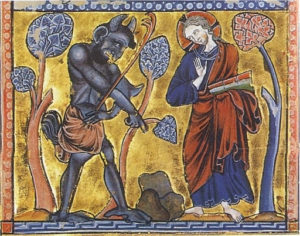Mount Calvary Church
Eutaw Street and Madison Avenue
Baltimore, Maryland
A Roman Catholic Parish of
The Personal Ordinariate of St. Peter
Anglican Use
Rev. Albert Scharbach, Pastor
Dr. Allen Buskirk, Choirmaster
Midori Ataka, Organist
Sunday, March 1, 2020
Lent I
8:00 AM Said Mass
10:00 AM Sung Mass
Brunch to follow in undercroft
_________________
Common
Missa de Angelis
_________________
Anthems
Miserere mei, William Byrd (1540-1623)
Miserere mei Deus, secundum magnam misericordiam tuam, et secundum multitudinem miserationum tuarum, dele iniquitatem meam.
Have mercy on me, O God, according to thy great mercy. According to the multitude of thy commiserations, take away mine iniquity.
________
O Lord, in Thy wrath, Orlando Gibbons (1583-1625)
O Lord, in thy wrath rebuke me not: neither chasten me in thy displeasure. Have mercy upon me, O Lord, for I am weak: O Lord, heal me, for my bones are vexed. My soul is also sore troubled: but, Lord, how long wilt thou punish me? O save me, for thy mercy’s sake.
_________________
The Great Litany in Procession
The Great Litany was the first service written in English. It was composed by Thomas Cranmer in 1544 from older litanies: the Sarum rite litany, a Latin litany composed by Martin Luther, and the Divine Liturgy of St. John Chrysostom. The word litany comes from the Latin litania, from the Greek litê, meaning “prayer” or “supplication.” Litanies are penitential exercises. They are the urgent supplications of the people of God suffering under or dreading divine judgements and asking to be spared or delivered from calamities which at the same time they confess that they deserve. After invoking the Trinity, we ask to be delivered from the evils that come upon us because of sin: heresy, schism, natural disasters, political disasters, war, violence, murder, and sudden death. As Baltimore experiences endless homicides and the world is threatened with a pandemic, let us pray this with especial fervor, knowing that God hears the prayers of those who humble themselves before Him.
_________________
Hymns
#335 Glory be to Jesus (CASWELL/WEM IN LEIDENSTAGEN) is an 18th century Italian hymn Viva! Viva! Gesu! Che per mio bene translated by Edward Caswell (1814–1878), an Anglican clergyman who converted to Catholicism and joined John Henry Newman at the Oratory in Birmingham.
Guide me, O Thou great Redeemer, was originally written in Welsh by a Methodist preacher William Williams (1719-91). It is a re-enactment of the Israelite journey through the barren wilderness to the Promised Land, which is the type of all spiritual pilgrimage, a pilgrimage we symbolize in the procession of the Great Litany and in the 40 days of Lenten journey through the desert of penance to the Promised Land of the Resurrection and the New Creation. The tune, CWM RHONDDA, sung in the trenches and mines as well as at numberless rugby matches, was composed in 1905 by John Hughes for a singing festival.
